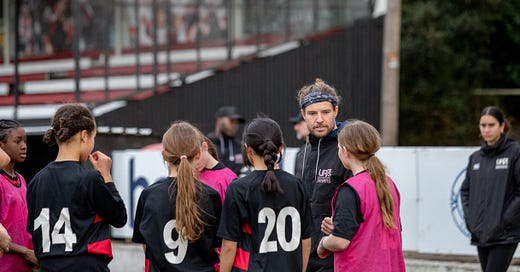My son asks me tough questions all the time.
“Why do we call the sky the sky?”
“How many bugs would fit in this toy car?”
“Why doesn’t our car have monster truck wheels?”
Only occasionally do I have the answer. (If you can help with the above please reply to this newsletter. Much appreciated!)
When you are in a leadership role, as captain of a team or within an organisation, there is often the sense that you need to be the authority on everything. Lots of us will have experienced this. The responsibility of leadership is bestowed upon you and suddenly there is this, often self-imposed, expectation to morph into an omniscient being.
Of course, sat in the cold light of day we would never hold ourselves to this standard attainable only by the gods. But when you’re stood at the front of a meeting or on a Teams call with multiple rectangular boxes filled with expectant eyes, and someone asks you a question…what then?
“I don’t know” are words we are reluctant to utter. Let’s explore that…
“Help me to understand the problem…”
Firstly, lets get practical. Have you truly understood the query? What is the assignment in this case? Even those with the utmost self-confidence might experience some brain shutdown based on fear of not knowing. So when it seems as if the situation might be leading you into the unknown, fear sets in and logical thinking dials down. As a result, we might miss some stuff. So, even if the hint of panic sets in, pause to consider if you understand what is being asked of you (at least then you can correctly assess whether or not you know the answer). It’s always alright to ask for clarification:
“Can I just check what it is you want to know?”
The one who knows all the answers has not been asked all the questions - Confucius
Vulnerability builds connection
My biggest barrier to deeper connection with the team at times was my reluctance to express vulnerability. The fear of being seen as weak or unworthy of my role prevented me from revealing authentic fear. Or not even fear, just lack of certainty.
Don’t get me wrong, there are times when the people around you need certainty. In pressure moments, they might want to see you appear assured, to emanate energy that ‘this is alright guys’. And using mental skills, you can be that person for the team whether you feel it or not. But others are only likely to truly trust you in these moments and buy into your energy if there have also been occasions when you have revealed that you don’t have the answer, that you aren’t certain.
So when might these opportunities of honesty arise?
A simple example was when we were analysing our training or matches. There was frequently a barrier to objective analysis because people didn’t want to be the ones getting it ‘wrong’ in front of the team. So when we were all watching the TV playing our match, people might hope the coach didn’t highlight my bad pass, or that I was out of position. [A silent sigh of relief when you weren’t the one being highlighted in that clip] This is not useful. It is a barrier to growth, both personal and collective.
That is where the leader can demonstrate useful behaviour. Role model the vulnerability. It doesn’t mean you are chuffed that you got something wrong. It will still ache a bit in your gut. But by putting your hand up and saying “I think I’m in the wrong position there” or “Does anyone have any ideas how I might have done this better?” you are giving others permission to do the same. Efficiency and rapid improvement soon follow.
People will not think less of you for this behaviour. Quite the opposite. It is a powerful bridge of trust.
This is emotional maturity. In the next post I will talk about how this emotional maturity can build into emotional agility. That’s when you can really add layers to your leadership skill.
What great thinkers and writers like Aristotle, Socrates, Einstein and Hemmingway all phrased in their own styles is that…
…as our understanding grows, we realise how little we know.




